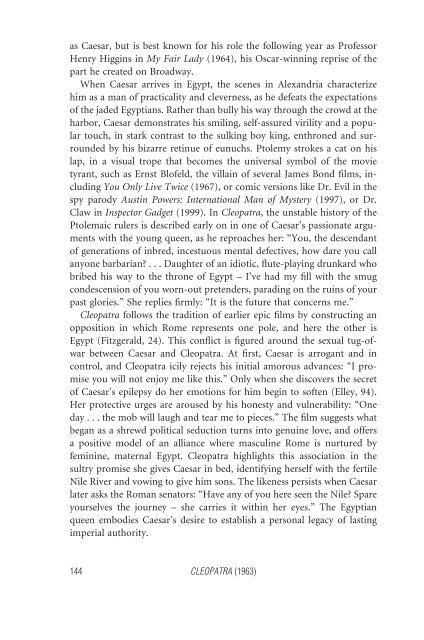Big Screen Rome - Amazon Web Services
Big Screen Rome - Amazon Web Services
Big Screen Rome - Amazon Web Services
Create successful ePaper yourself
Turn your PDF publications into a flip-book with our unique Google optimized e-Paper software.
as Caesar, but is best known for his role the following year as Professor<br />
Henry Higgins in My Fair Lady (1964), his Oscar-winning reprise of the<br />
part he created on Broadway.<br />
When Caesar arrives in Egypt, the scenes in Alexandria characterize<br />
him as a man of practicality and cleverness, as he defeats the expectations<br />
of the jaded Egyptians. Rather than bully his way through the crowd at the<br />
harbor, Caesar demonstrates his smiling, self-assured virility and a popular<br />
touch, in stark contrast to the sulking boy king, enthroned and surrounded<br />
by his bizarre retinue of eunuchs. Ptolemy strokes a cat on his<br />
lap, in a visual trope that becomes the universal symbol of the movie<br />
tyrant, such as Ernst Blofeld, the villain of several James Bond films, including<br />
You Only Live Twice (1967), or comic versions like Dr. Evil in the<br />
spy parody Austin Powers: International Man of Mystery (1997), or Dr.<br />
Claw in Inspector Gadget (1999). In Cleopatra, the unstable history of the<br />
Ptolemaic rulers is described early on in one of Caesar’s passionate arguments<br />
with the young queen, as he reproaches her: “You, the descendant<br />
of generations of inbred, incestuous mental defectives, how dare you call<br />
anyone barbarian? . . . Daughter of an idiotic, flute-playing drunkard who<br />
bribed his way to the throne of Egypt – I’ve had my fill with the smug<br />
condescension of you worn-out pretenders, parading on the ruins of your<br />
past glories.” She replies firmly: “It is the future that concerns me.”<br />
Cleopatra follows the tradition of earlier epic films by constructing an<br />
opposition in which <strong>Rome</strong> represents one pole, and here the other is<br />
Egypt (Fitzgerald, 24). This conflict is figured around the sexual tug-ofwar<br />
between Caesar and Cleopatra. At first, Caesar is arrogant and in<br />
control, and Cleopatra icily rejects his initial amorous advances: “I promise<br />
you will not enjoy me like this.” Only when she discovers the secret<br />
of Caesar’s epilepsy do her emotions for him begin to soften (Elley, 94).<br />
Her protective urges are aroused by his honesty and vulnerability: “One<br />
day . . . the mob will laugh and tear me to pieces.” The film suggests what<br />
began as a shrewd political seduction turns into genuine love, and offers<br />
a positive model of an alliance where masculine <strong>Rome</strong> is nurtured by<br />
feminine, maternal Egypt. Cleopatra highlights this association in the<br />
sultry promise she gives Caesar in bed, identifying herself with the fertile<br />
Nile River and vowing to give him sons. The likeness persists when Caesar<br />
later asks the Roman senators: “Have any of you here seen the Nile? Spare<br />
yourselves the journey – she carries it within her eyes.” The Egyptian<br />
queen embodies Caesar’s desire to establish a personal legacy of lasting<br />
imperial authority.<br />
144 CLEOPATRA (1963)



